
Goan literature is the literature pertaining to the state of Goa in India.
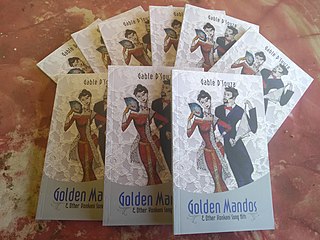
Music of Goa refers to music from the state of Goa, on the west coast of India. A wide variety of music genres are used in Goa ranging from Western art music to Indian classical music. Konkani music is also popular across this tiny state. Being a former territory of Portugal, Goa has a dominant western musical scene with the use of instrument such as the violin, drums, guitar, trumpet and piano. It has also produced a number of prominent musicians and singers for the world of Indian music. Portuguese Fado also has significance in Goa.

Bijaya Jena (also known as Dolly Jena or Bijoya Jena, born 16 August in Cuttack, Odisha, is an Indian actor, film director and producer. She won the Indian National Film Award for the Odia language film Tara.

Luís Remo de Maria Bernardo Fernandes, known professionally as Remo Fernandes, is a Portuguese singer and musician of Indian origin. Known as a pioneer of Indian pop music, he performs pop/rock/Indian fusion and is also a film playback singer. His musical work is a fusion of many different cultures and styles that he has been exposed to as a child in Goa and in his later travels around the world. Such influences include Goan and Portuguese music, Sega music, African music, Latin music, the music of erstwhile European communist states, those of the dance halls from Jamaica and Soca.
Hema Sardesai, also known as Hemaa Sardesai, is an Indian playback singer and lyricist. Hema hails from the coastal state of Goa, in India, and was born in Mumbai. She shot to fame in 1997 with songs from movies like Sapnay, Biwi No. 1 and Jaanam Samjha Karo.

Lorna Cordeiro, also known as Lorna, is a Konkani singer from the coastal state of Goa, India, and is popularly known as the "Nightingale of Goa".
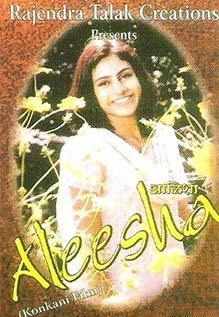
Aleesha is a Konkani film released in 2004 in Goa, India. It was directed by Rajendra Talak and featured Priyanka Bidaye and Rajeev Hede in the lead roles.
Chris Perry, was an Indian musician, composer, songwriter, and film producer who combined jazz with Konkani music. He was known in India as the 'King of Cha Cha Cha' and the 'Man with the Golden Trumpet', and was the composer of the signature song of All India Radio.

Damodar Mauzo is an Indian short story writer, novelist, critic and script writer in Konkani. He was awarded the 57th Jnanpith Award, India's highest literary honour, in 2022, Sahitya Akademi Award in 1983 for his novel Karmelin and the Vimala V. Pai Vishwa Konkani Sahitya Puraskar award for his novel Tsunami Simon in 2011. His collection of Short stories Teresa's Man and Other Stories from Goa was nominated for the Frank O'Connor International award in 2015. He has served as a member of the executive board, general council, as well as the finance committee of the Sahitya Akademi.
Aparna Raina is an Indian production designer. She started her career in 2006 as an art assistant on the film Khosla Ka Ghosla and a set dresser in the critically-acclaimed film The Namesake. Since then she has worked on several films as art director and production designer. She was recently recognized for her work in the hit Konkani language film Nachom-ia Kumpasar, for "convincingly recreating spaces from a different era and with minute attention to detail". She was awarded the 62nd National Film Awards for Best Production Design for Nachom-ia Kumpasar.

John D'Silva is an Indian Konkani actor, playwright, and director. D'Silva is the first tiatrist to enter the Limca Book of Records in 2010 for acting, writing, directing and producing 25 tiatrs having a double alphabet in their titles.

VIFF Vienna Independent Film Festival is an international film festival held annually in July in Vienna, capital of Austria. The festival focuses on independent cinema.

Home Sweet Home is a 2014 Indian Konkani language comedy film written and directed by Swapnil Shetkar and starring John D'Silva, Rajdeep Naik and Aryan Khedekar. The film is produced by Swapnil Shetkar and Madhav Gad under the banner of Go Goa Gollywood Productions. This film is inspired from real life incidents of land scam in Goa. It was released commercially all over Goa on 26 December 2014 and became an instant hit with unprecedented box office performance for a Konkani film despite being pitted against Amir khan starrer PK, one of the biggest Hindi film. It ran for 101 days in Goa during its initial release and completed a record number of 600 shows. This film has completed more than 1000 shows theatrically by December 2016, thus becoming the most successful konkani film on the box office.
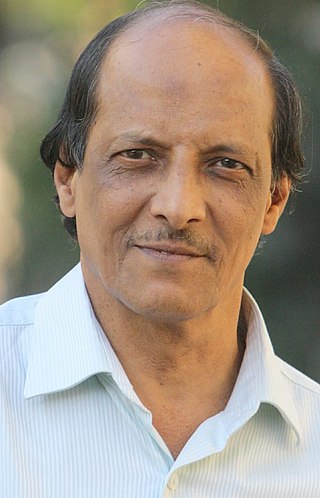
Isidore Dantas, is an author, translator and lexicographer from Pune, Maharashtra working in the Konkani language. Noted for his interest in Konkani film, he is best known for his book on Konkani cinema and for having co-authored an English-to-Konkani dictionary. He has authored five books, co-authored a dictionary and translated two books.

Juze or Juje is a 2017 Indian film in Konkani, written and directed by Miransha Naik. The film is about the social injustice and exploitation faced by migrant labourers in Goa, and is set in the 1990s. It was co-produced by people from India, France and Netherlands under the banner of Goa Film Bazaar, with some of the editing done in Paris.
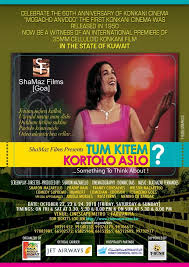
Tum Kitem Kortolo Aslo? is a 2010 Indian Konkani language film written and directed by Sharon Mazarello. The film also features Mazarello in the lead role. The story is about infidelity, from the perspective of the woman. It was produced by Mazarello and her husband, Wilmix Mazarello, under the banner of ShaMaz Films. The film premiered at the Cinescope Metro in Kuwait on 22 October 2010, marking the 60th anniversary of the release of Mogacho Anvddo, the first Konkani film. With this film, Mazarello became the first woman to direct a Konkani movie.
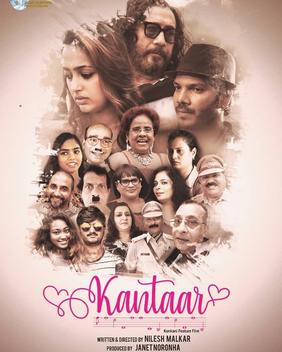
Kantaar (transl. Song) is a 2019 Indian Konkani-language film written and directed by Nilesh Malkar and produced by Janet Noronha. It stars Jackie Shroff, Noel Sean and Ester Noronha. The film is about life in Goa, and finding purpose in life. After the award-winning Soul Curry, it is Malkar and Jackie's second Konkani film. The musical film features Lorna singing some jazz songs. It premiered at Ravindra Bhavan, Margao, on 28 January 2019.

Mario Piedade Menezes, popularly known by his sobriquet Tragedy King, was an Indian actor, director, writer and prominent tiatrist. He primarily worked on the Konkani stage and was the vice president of Tiatr Academy Goa.

Palomi Ghosh is an Indian film actress best known for her work in Hindi, Konkani, and English language films. She is a recipient of the National Film Award – Special Mention for the Konkani musical drama Nachom-ia Kumpasar.

















